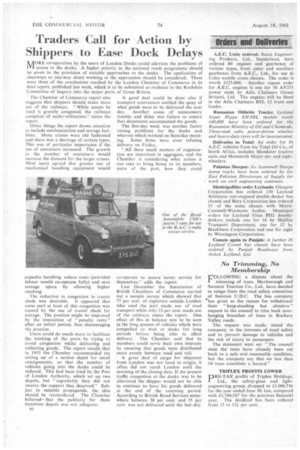Traders Call for Action by Shippers to Ease Dock Delays
Page 40

If you've noticed an error in this article please click here to report it so we can fix it.
NSORE co-operation by the users of London Docks could alleviate the problems of IVI access to the docks. A higher priority in the national roads programme should be given to the provision of suitable approaches to the docks. The application of clearways or one-way street working at the approaches should be considered. These were three of the conclusions reached by the London Chamber of Commerce in its final report, published last week, which is to be submitted as evidence to the Rochdale Committee of Inquiry into the major ports of Great Britain.
The Chamber of Commerce report also suggests that shippers should make more use of the railways. "While access by road is gravely congested, the railways complain of under-utilization," states the report.
Other things the report draws attention to include mechanization and storage facilities. Many cranes were old fashioned and there was a shortage of certain types. This was of particular importance if the use of containers increased. The growth in the number of containers would increase the demand for the larger cranes. Most users agreed that greater use of mechanical handling equipment would expedite handling, reduce costs (provided labour would co-operate fully) and save storage space by allowing higher stacking.
The reduction in congestion in transit
sheds -was desirable, It appeared that some part at least of this congestion was caused by the use of transit sheds for storage. The position might be improved by the imposition of "penalty rents" after an initial period, thus discouraging the practice.
Users could do much more to facilitate the working of the ports by trying to "avoid congestion whilst delivering and collecting goods. The report recalls that in 1955 the Chamber recommended the setting up of a section depot for small consignments, so that the number of vehicles going into the docks could be reduced. This had been tried by the Port of London Authority, which set up two depots, but " regrettably they did not receive the support they deserved." Subject to suitable propaganda, the idea should be reconsidered. The Chamber believed • that the publicity for these reception depots was not adequate.
n6
A good deal could be done also if transport contractors notified the quay of what goods were to be delivered the next day. Another cause of unnecessary trouble and delay was failure to ensure that documents accompanied the goods.
The five-day week was another factor raising problems for the docks and wharves which worked on Saturday morning. Some firms were even refusing delivery on Friday.
"All these small matters of organiza[loll are important in aggregate, and the Chamber is considering what action it can take to bring home to its members. users of the port, how they could co-operate to secure better service for themselves.adds the report.
Last December the Association of British Chambers of Commerce carried out a sample survey which showed that 77 per cent, of exporters outside London who used the port made use of road transport while only 23 per cent. made use of the railways, states the report. One effect of this in balance was to be seen in the long queues of vehicles which were compelled to wait at docks for long periods before being able to effect delivery. The Chamber said that its members could serve their own interests by ensuring that goods were distributed more evenly between road and rail.
• A great deal of cargo for shipment from London was not local in origin; it often. did not reach London until the morning of the closing date. If the present traffic congestion at the docks was to be alleviated the shipper would not be able to continue to have his goods delivered at the end of the receiving period. According to British Road Services somewhere between 30 per cent. and 35 per cent, was not delivered until the last daY.




















































































































